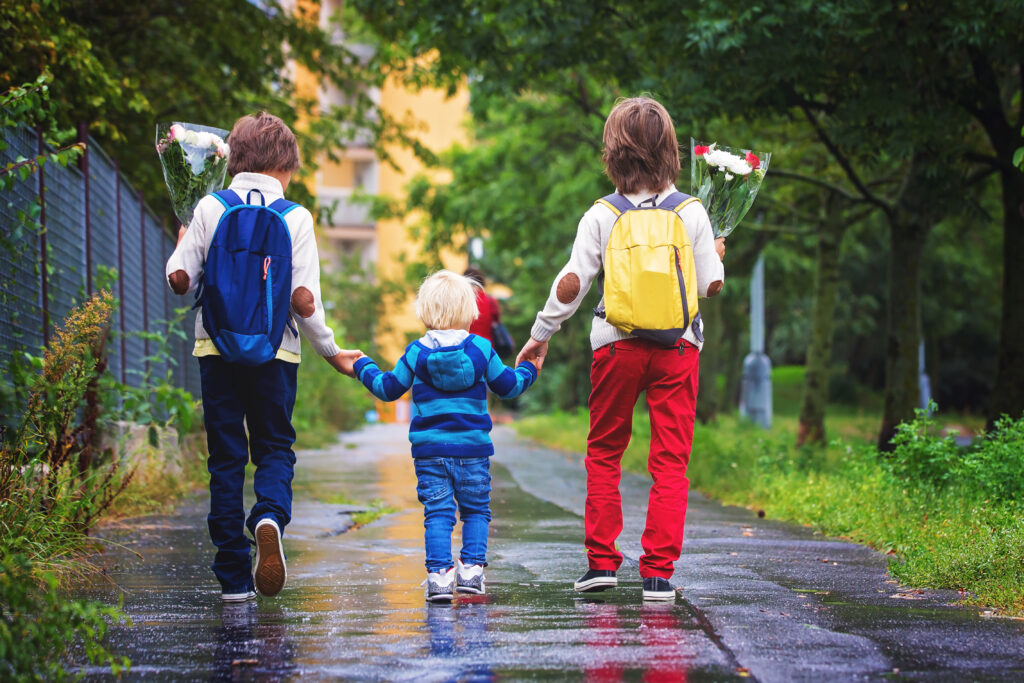
When children move into care, siblings can be the only people who truly understand their experiences. They’ve lived in the same home, shared similar experiences, and have been by their side throughout their short lives.
However, the sad fact is that around 37% of children who have a sibling are separated from them when they move into foster care. In this article, we explore the reasons why keeping siblings together matters, including the positive impacts it can have on their well-being, sense of identity, and future relationships.
Understanding sibling separation in foster care
Sometimes, siblings are unable to remain together in foster care. Here are some of the reasons why:
- Foster families: Some foster parents may not have space in their home for a sibling group, while others may feel that caring for more than one child would be too difficult to manage.
- Safeguarding: In some cases, it may be unsafe for siblings to live together, for example, if one child is harming the other.
- Adoption: Sometimes, younger children in a sibling group are adopted because it’s in their best interests.
- Individual needs: Some children may require more individualised or specialist care than their siblings, making it more beneficial for them to be fostered alone.
At Clifford House, we believe that wherever possible, siblings should be fostered together. Sibling bonds are like no other, and below, we explore why they are so important.
Why are sibling bonds important?
Forming a sense of identity
When we think about who we are, we often reflect on our relationships and the roles we play within them. That’s because these relationships help us understand who we are.
We may say we’re a mother, brother, or friend, and we play a different role within each relationship. For example, we may be the friend people turn to when they need advice, and our partner may be the person we lean on.
It’s the same for children and their relationships with their siblings. They may see themselves as the protector of younger siblings or turn to older siblings for comfort when they’re scared.
If children are separated when they move into care, their relationship with their siblings will suddenly change, impacting their sense of identity. When siblings are fostered together, they can still play the part of younger or older siblings and grow together. It also helps them remain connected to their past, which although may have been painful, can also help them understand who they are.
Enhancing well-being
Picture this – you have been told that you can no longer live with your parents and that you’ll be leaving everything you’ve ever known behind to move in with a new family. You may feel anxious, scared, and sad to be leaving the family home, but knowing you’ll be with your siblings brings you some comfort.
Then you find out that you won’t be living with your siblings – and you could be miles apart. You may feel angry, upset, and grief-stricken. If you made a disclosure about things going on at home, you might even blame yourself and feel like you’re being punished for speaking up.
Separating siblings can have a detrimental impact on children’s mental well-being. Their shared history, which may have included abuse, neglect, or the death of a parent, means they can often share a profound connection.
When children are kept together in foster care, they can provide comfort, a listening ear, and a deep understanding of each other’s thoughts and feelings. This can help reduce anxiety, support their healing and enhance their mental and emotional well-being.
Nurturing secure relationships
Our early relational experiences can teach us a lot about the world. Through secure relationships, we may learn that people are safe, trustworthy, and always have our best interests at heart. When relationships are fraught with abuse and neglect, however, they can teach us that the world is a scary place – that people are unsafe, untrustworthy, and don’t care about our thoughts, feelings, or well-being.
For children in care who may not have experienced a safe and secure relationship with a parent, their relationship with a sibling may be the only long-term, safe and loving relationship they’ve ever known.
When they move into care together and can be children again, their bond has the chance to grow and become a positive blueprint for future relationships. Sibling relationships can often outlast friendships and relationships with other family members over the course of their lives.
That’s why it’s so important to nurture sibling bonds and ensure that children in care have the chance to grow up with the one constant who’s been with them through all the ups and downs – their siblings.
Promoting positive behaviour
When a child first moves into your home, it can take time to build a bond and for them to feel safe enough to verbally express their thoughts and feelings.
If a child can’t articulate their feelings, they may communicate them through their behaviour instead. For example, they may struggle to regulate their emotions and may behave in ways you’re uncomfortable with or shut down completely.
Having siblings by their side can help children manage their emotions and settle into their new home more easily. As they’ve already built a secure relationship with their sibling, they are more likely to turn to them when things feel hard, opening up about what’s happening beneath the surface. As a result, they are less likely to act out at home or school because they have a trusted outlet for their feelings.
This can have a positive impact on your relationship with them, help them get the most out of school, and support their emotional development.

Support for fostering siblings
At Clifford House, we understand the importance of sibling bonds and the long-term benefits of siblings living in the same foster home.
However, we also recognise why some foster parents may hesitate to foster a sibling group. So, here are some common concerns about fostering siblings and how we’ll support you:
Do I have enough room in my home?
When you foster a child, they must have their own room. However, when you foster siblings, sometimes they can share a bedroom if they had a similar set-up in their birth home, and continuing to do so could support their well-being.
Can I afford to foster siblings?
When you foster with us at Clifford House, you join a fostering agency that values foster parents. You’ll receive a generous fostering allowance for each child in your care. So, if you foster siblings, you’ll receive a higher allowance. You’ll also benefit from a range of perks, including:
- £100 birthday allowance for each child.
- £100 religious festival allowance for each child.
- Free year-round activities and events for the whole family to enjoy.
- Exclusive discounts on our foster parent’s rewards platform.
- Complimentary membership to FosterTalk.
- Opportunities to earn an additional bonus for referring friends and family members to foster with us.
The combination of your fostering allowance and additional bonuses means you can rest assured that opening your home to a sibling group won’t negatively impact your finances.
Do I have the parenting skills to foster siblings?
You don’t need experience to foster siblings because our trauma-informed training programme will give you the skills, knowledge, and confidence to provide the care children need.
Our training is bespoke, focusing on trauma, attachment theory, brain development, and helping children heal. We’ll teach you how to care for siblings who have experienced trauma, and you’ll have access to additional courses to broaden your understanding of each child’s specific needs.
What support will I receive when fostering siblings?
At Clifford House, you’ll receive 24/7 support. So, no matter the day or hour, you know we’ll always be by your side.
We believe in the power of community and provide opportunities for you to meet other foster parents and build a wider network to lean on through our support groups, activities, and meet-ups. You’ll also have your own supervising social worker and access to a wider team of fostering professionals, including educational specialists, social workers, and more.
We’ll work closely with you to nurture the siblings in your care and help them reach their full potential.
Can I foster siblings if I already have a child?
Yes, you can foster siblings if you already have children of your own or foster another child. During your fostering assessment, we’ll really get to know you and your family so that when we receive a referral, you’ll be matched with a sibling group that fits in well with your family.
Once you welcome a sibling group into your home, your supervising social worker will ensure every family member feels safe, valued, and heard through regular visits.
Enquire today!
If you want to learn more about fostering siblings or the steps involved in becoming a foster parent, call us on 0800 369 8515 or fill in our online enquiry form, and we’ll call you.
